QuestionHi,
I have my 2 months old labrador who is full of enthu and energy and very lovable. My problem is' he is always full of energy but never listens to what is being trained[ he has not learnt to even leek/pee in a single place in spite of being taught several times. also he never concentrates on whatever is being told or trained[ I am not sure if he is too young for this]?? Could you please suggest me what i can do as this has made me very upset.Also he eats up his own excreta as soon as he does it[ which he is not doing now when asked to, but if no one is around he will do it again].
Your response will be greatly appreciated.
AnswerMany puppies are that way. At that age, you must keep training sessions short, just a few repetitions a a command at a time. They do learn quickly. There are some things you can do to help him bond to you and respect you as a leader. ''Elevation for small puppies: Sit on the floor and gently put your hands around your pup's middle, below his front legs, and lift him up. He is facing you. Hold him for 15 seconds. Repeat until he no longer struggles. If he is past 10-12 weeks, lift his front feet off the ground, but don't pick him up.
Cradling for small puppies: Hold your puppy gently on his back, as you would cradle a small baby. If he struggles, hold him firmly until he quiets for 10-15 seconds. With larger pups, you can do this as your sit on the floor, with your pup between your legs.
Quiet lying down: Place your pup on the floor on his side, with all 4 legs pointing away from you. Use your hands on his neck/shoulder area and middle, to hold him in this position. When he is quiet, praise him. Lengthen the time that you keep him quietly in this position. When he accepts this position well, handle his paws and muzzle, while keeping him quiet.''
The quotes mean this isn't my original work. It is copied from my Puppy Raising Manual. I have long used these or minor variations of them, and they are very effective. You may want to give him a belly rub while he is on his back too. Helps bonding. There is a big difference between him rolling over and demanding a belly rub, and you choosing a time to roll him over and rub his belly. The latter cements your place as pack leader.
Much of housebreaking is not training the puppy, but making it easier for your puppy, you, and your carpet while its body to catches up to its instincts. At around 8 weeks when the puppy goes to its new home, the time from when it realizes it has to go, and when it can't wait any longer is a matter of seconds. Only time will fix that. You can hardly be expected to be attentive enough to avoid all accidents. There is no sense punishing the puppy for your inattention. It is not fair to punish you either, but you still have to clean it up if you didn't have the puppy outside in time.
Housebreaking starts before you get home with the new puppy. If you don't have a crate, buy one. I prefer the more enclosed, den like plastic ones. Skip the bedding. At first it gets wet, and later it can be chewed into choking hazards. A wire grid in the bottom will help keep the puppy up out of accidents at first. They are available with the crates, but expensive and hard to find. A piece of closely spaced wire closet shelving from a home supply place is cheaper. I am now using a plastic vegetable bin with plenty of holes drilled in the bottom. It helps block off part of the crate for the smaller puppy. If you already have a metal crate, covering it may help. Just make sure you use something the puppy can't pull in and chew. Dogs that start out in crates as little puppies, accept them very well. Never leave an unattended puppy loose in the house. If nobody can watch it, put it in the crate. I suggest letting the dog have its crate all its life. A crate needs to be just big enough for a dog to stretch out in.
Choose a command and spot you want it to use. The less accessible to strays, the less chance of serious disease. If it is a female, choosing a non grassy spot will avoid brown spots later. When you bring it home, take it to the spot and give it the command in a firm, but friendly voice. Keep repeating the command and let the puppy sniff around. Sometimes you need to walk it around to stimulate its body to eliminate. If it does anything, praise it. Really let it know what a good dog it is and how much you love it, and maybe a treat. Note, being out there not only means you can praise it, but it also keeps it from being snatched by a hawk. If it doesn't go, take it inside and give it a drink and any meals scheduled. A young puppy will need to go out immediately afterward. Go to the spot and follow the above routine. Praising it if it goes is extremely important. If it doesn't go, take it back inside and put it in its crate and try again soon. Do not let it loose in the house until it does go.
At first it is your responsibility to know and take the puppy out when it needs to go. It needs to go out the first thing in the morning, after eating, drinking, and sleeping. If it quits playing, and starts running around sniffing, it is looking for a place to go. Take it out quickly. You will just have to be what I call puppy broke until it is a little older. How successful you are depends on how attentive you are.
By the time most dogs are about 3 months old, they have figured out that if they go to the door and stand, you will let them out. The praise slowly shifts to going to the door. Some people hang a bell there for the dog to paw. If your dog doesn't figure this out, try praising it and putting it out if it even gets near the door. When you catch it in the act, give it a sharp ''Ah, ah, ah!'' and take it out. Clean up accidents promptly. I mostly keep the little puppies out of the carpeted rooms. Still I need the can of carpet foam sometimes. First blot up all the urine you can with a dry towel. Keep moving it and stepping on it until a fresh area stays dry. A couple big putty knives work well on bowel movements. Just slide one under it while holding it with the other. This gets it up with a minimum of pushing it down into the carpet. This works with even relatively soft ones, vomit, dirt from over turned house plants, or anything else from solids to thick liquids. Finish up with a good shot of carpet foam. Note, do not let the puppy lick up the carpet foam. Once the dog is reliably housebroken, your carpet may need a good steam cleaning.
Many people strongly strongly push cleaning up all evidence of past accidents. I am slower to suggest that. Dogs will return to the same spot if they can find it. When you see one sniffing the spot, that is your clue to run it out.
The best solution to stool eating, coprophagy, is cleaning them up before the dog has a chance. You can try food additives, the home remedies pineapple juice or canned pumpkin or the commercial products Forbid or Deter.
Why dogs do it is poorly understood. It may be diet related, but changing the dog's diet might cause worse problems. Whatever problems it causes for the owner, it doesn't seem to hurt the dog unless you are trying to clear up a worm infestation.

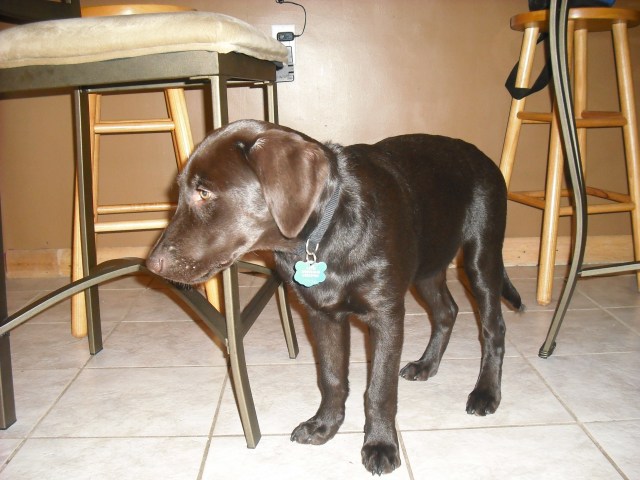 is my lab too small
Question
Reese
I have a 19 week old Male chocolate lab.
is my lab too small
Question
Reese
I have a 19 week old Male chocolate lab.
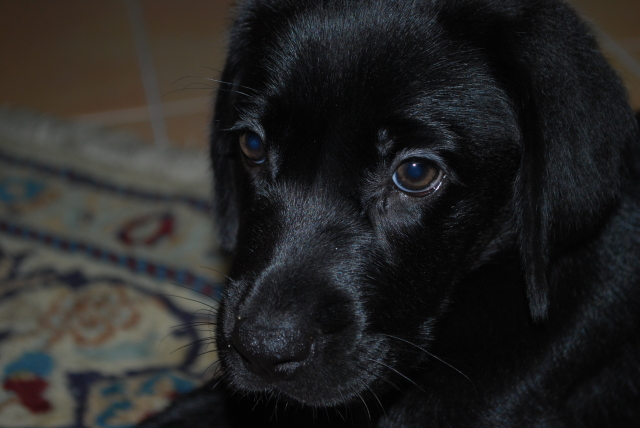 Labrador behaviour
Question
Gordie
Name: Gordie
Age: 4 months
Sex: Male
N
Labrador behaviour
Question
Gordie
Name: Gordie
Age: 4 months
Sex: Male
N
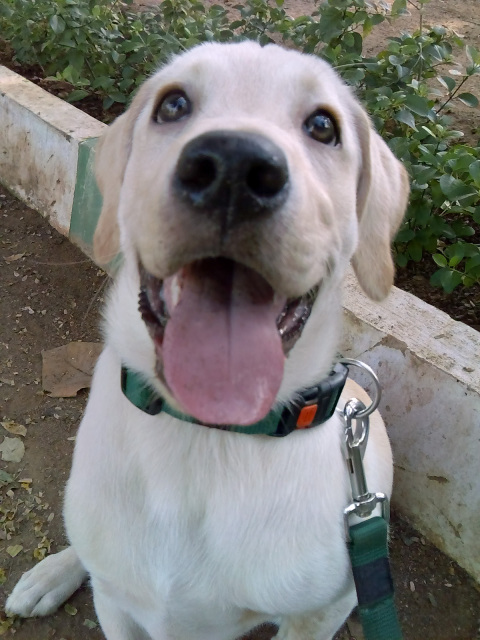 Hyper active Labrador Pupp.
Question
Benji
Hello Jen,
&nbs
Hyper active Labrador Pupp.
Question
Benji
Hello Jen,
&nbs
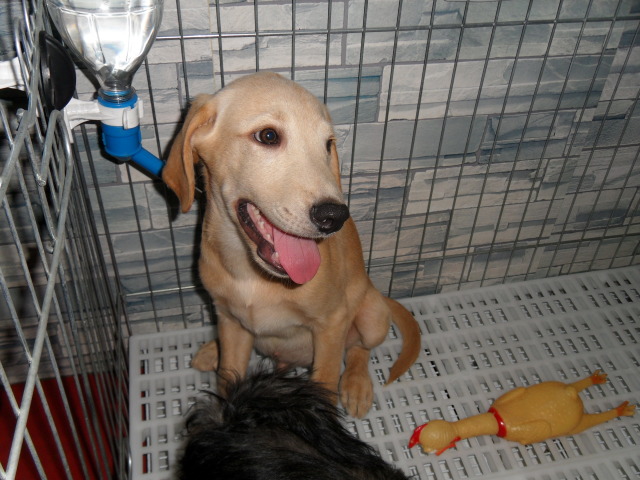 Is my dog a pure-bred lab?
Question
Sort of top view
Hi. I recently received
Is my dog a pure-bred lab?
Question
Sort of top view
Hi. I recently received
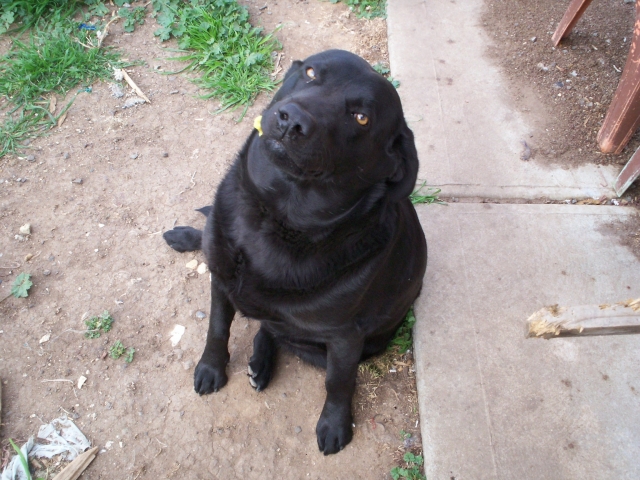 lab healthy weight
Question
Cassie
I have a black lab and she is now 3 1/2
lab healthy weight
Question
Cassie
I have a black lab and she is now 3 1/2